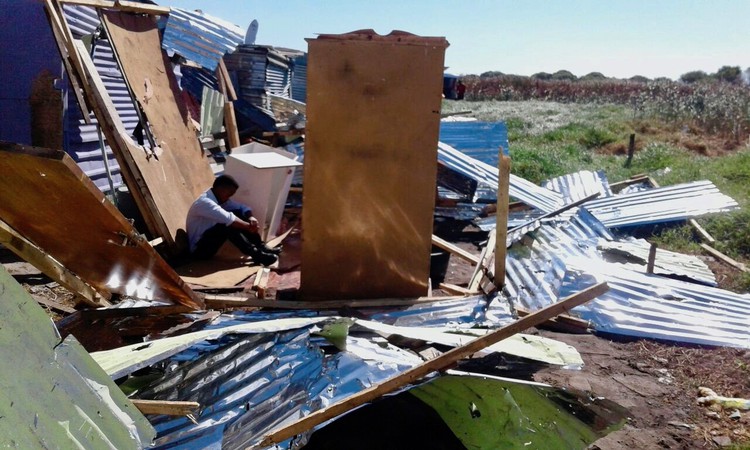
21-year-old Andile Jadu after his shack was demolished for the fourth time. Photo: Rosemary Milbank
24 February 2017
Andile Jadu is 21 and lives in the Masiphumelele wetlands. His one-room shack has been demolished four times by the City of Cape Town.
He says the first time his home was demolished he was at work. “When I came back from work, I saw that my home was gone. I rebuilt it the same day on my own, because I didn’t know anyone.”
Three days later, it was again demolished by the City’s Anti-Land Invasion Unit (ALIU). Like many others, he rebuilt the same day. The ALIU returned two more times, leaving Jadu and other residents homeless. This happened over January and February.
“I felt like a joke because people were looking at me when I kept rebuilding. I felt demoralised. I didn’t know what to do,” he says. But he has a job in Cape Town and doesn’t want to go Port Elizabeth, where he comes from.
Jadu wanted to study Human Resources after finishing high school, but he could not afford the tuition. Pick ’n Pay head office offered him a job as a cashier in Cape Town, and he moved from Port Elizabeth to Masiphumelele.
With no family in the Western Cape, Jadu lived with a friend until he managed to save enough to buy the materials he needed for his own shack. “I had spoken to the community leaders and because they saw that I was desperate for a place to stay, they showed me where I could put my shack,” says Jadu.
The cost of building a small shack like Jadu’s starts at around R3,000 depending on its size. Every time Jadu rebuilds his shack, he has to spend money because the building materials are often damaged during mass demolitions.
Jadu says it costs him about R1,000 each time. A zinc sheet costs R120, a pole costs R40, and you need about 50 poles and battens to build a shack. A window costs R250 and a door R350. Jadu says his father and his younger brother in Port Elizabeth depend on him. He earns about R4,500 a month.
To rent a backyard shack costs R1,500, but places are scarce.
After the fourth demolition, he gave up. Jadu now stays with a friend. But he is still looking for a safe place to rebuild his shack.
Councillor Eddie Andrews, the City’s Mayoral Committee Member for Area South, says a number of structures were dismantled by the City of Cape Town over the past few weeks and that it was carried out in terms of an existing court order.
“The issues surrounding the illegal occupation of the wetlands have been constantly raised with the various leadership groupings in Masiphumelele … there is no available land in Masiphumelele,” says Andrews.
“The City will continue to remove illegally erected structures in the wetland area or near the site of the Masiphumelele Phase 4 housing project.”
See also: Noordhoek eco-estates protect the rich from the reality of Masiphumelele